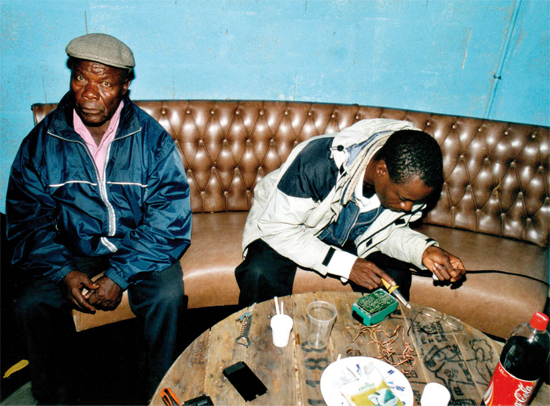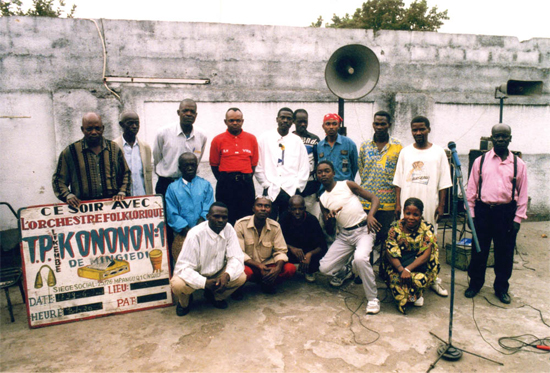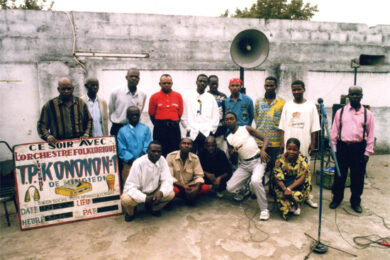Anyone who has spent time in Kinshasa, the capital of the Democratic Republic of Congo, will know that it’s a city that bustles with an industrious and infectious energy. Maybe it was living there that inspired Mawangu Mingiedi to take that energy and apply it like jump leads to the Bazombo trance music he had grown up with near the Angolan border. In doing so, he created a band called Konono No.1 and revolutionised a musical tradition that stretched back hundreds of years.
The impact Konono No.1 have had on Bazombo music has been literally electrifying. When Mingiedi found himself unable to find the sound he was looking for using traditional instruments he took it upon himself to build the first ever electric likembe. The likembe is a kind of handheld piano played with the thumbs, but amplification using magnets salvaged from old cars transformed it. When the band plays the likembe on stage it looks like they’re operating oversized remote controls. It sounds like nothing you’ve ever heard before.
Augustin, Mingiedi’s son, says that the instrument is integral to what Konono No.1 is: "We play with the likembe that we made ourselves, so that really sets us apart from other bands sonically." Mingiedi, now in his 70s, was unable to join his band on their recent European tour, leaving Augustin to assume the mantle of bandleader. He told me: "There was a time when Konono existed solely because of the existence of the instruments and because of my father. Then a record label came over and offered some financial backing for a record so my father started a school to get more people involved and to teach people likembe. That is how we got started as a group and we’ve grown from that."
That record label was Belgium’s Crammed Discs, and the man who persuaded them to get involved in Konono No.1 was producer Vincent Kenis. He is happy to tell me about the "universal and timeless appeal of their music" and says that he first discovered the band thanks to a French Radio station: "I first heard them in the late 70s while listening to France Culture, a state run French radio. They had been recorded in the street by radio producer Bernard Treton who had stayed for one year in Kinshasa under contract with national radio. Their distorted sound was unique, but at the same time very strange and very familiar. Their trashy sound and raw energy seemed to fit perfectly the aesthetics of the times."
Kenis was amazed by how much the electrified Bazombo that Konono played resembled the experimental music he was making. "I considered Konono N°1 as a distant cousin of the Honeymoon Killers, the group I was playing with then. Of course our approach was completely different: we wanted to experiment, to break sonic barriers, to provoke, whereas they had started experimenting with new sounds forced upon them by circumstance: if they wanted their music to be heard, they had no other choice than to push their amplification equipment to the limit, discover that their instruments responded in a totally different way, and invent new techniques to master them: just like a heavily amplified solid body electric guitar, Konono’s thumb pianos go into infinite sustain if you don’t mute the notes, and the more or less graceful or musical way you mute these notes is really important in both cases. And since dealing with distortion has its own physically induced and largely unspoken constraints and tactics, no matter if you come from Kinshasa or Chicago, you share at least that common ground as far as perception is concerned. The thrill is the same."
Kenis eventually tracked down Konono No.1 after a Stanley-esque journey across the Congo. He jokes that when he finally came face-to-face with Mingiedi, he greeted him with the words, "Grand Maître Mingiedi Mawangu, I presume?" The two men would go on to form a successful working relationship, with Kenis producing Konono’s debut album Congotronics in 2004 and returning to work on this year’s follow up Assume Crash Position.
Over the last six years Kenis has been witness to Konono’s developing sound and has overseen collaborations with the likes of Björk and Herbie Hancock. So does their music still abide by the traditions of Bazombo? Kenis says it does: "Much more strictly that you would think at first. Of course the very peculiar scale system is specific to their tradition, although personal taste comes into play on the microtonal level: Augustin’s thumb piano is tuned slightly differently than Mingiedi’s. The tempos are very precisely defined, and immutable: song X is to be played at tempo Y and no other."

Kenis points out that this discipline doesn’t always lend itself to collaboration. "It led to some unexpected difficulties when recording with Herbie Hancock last summer. The producer had made a demo of a song using a loop of ‘Kule Kule’ featured on Konono’s Congotronics. Having been recorded in unusual circumstances – in a Brussels cave with no drums – that particular version of ‘Kule Kule’ was unusually slow. When Konono had an initial jam with Herbie following the click of the demo, some wonders happened… but as soon as Konono listened to the demo, and as soon as they recognized the loop as coming from ‘Kule Kule’, they couldn’t play in time with the click any more: they kept accelerating, even though we had removed the loop from the mix… it took them quite a while to forget they were playing on ‘Kule Kule’ and start feeling at ease again."
Augustin agrees with Kenis, and suggests that their adherence to tradition has cost the band fans back at home. He says it’s very different playing shows in the UK, such as their recent set at Matt Groening’s ATP, compared to performing in the Congo: "People are not so interested in traditional music in the Congo. We do organise concerts and people come to see us, but more people come to see us here. It’s a different scene over there. At ATP it was really hot. That fired us up when we were playing. It was like a normal show, but hotter!"
Konono are the sort of band who can’t help but get the crowd moving. Their London show is entrancing and intense while still feeling like a free-form, spontaneous performance. It seems to be a style they’ve developed from playing parties in Kinshasa. They may get smaller crowds there, but their Congolese shows have become the stuff of myth: marathon sets stretching through the night. Augustin points out that they have to adapt to the set times they’re afforded in the UK, but somehow they still manage to compress all that energy into one performance. "Yes, in the Congo, sometimes we play all night. When we do that, we will play non-stop for forty minutes, then take a fifteen minute break and then play for forty minutes again. When we play here, there are time limits so we have a window in which we have to play. We can’t go on all night! Because we have curfews we just play right through, so it makes for a long, non-stop show."
For Augustin, the shows are the culmination of many years of hard-work alongside his father. "When I was growing up I remember being close to my father and following him in everything he did," he says. "He didn’t formally teach me how to play likembe, I just watched and discovered it for myself. Even from the age of seven I remember really looking up to him and wanting to learn to play like him."
Now, the reception their version of Bozombo music is receiving all over the world makes their work worthwhile. "It’s unbelievable. It’s supernatural. No-one expected it. When we were practicing back home, sometimes people would come along and tell us ‘That’s really good, you should really get the music out there’, but no-one really thought it would happen. Some of the people who said that have since died. It’s taken a long time, but now it’s happened. The moment has arrived and it’s incredible."
That relationship between Bozombo trance music, the likembe as an electric instrument and Konono No.1 makes them feel like more than a band. They’re a unique musical experiment as well as a treasured inheritance to be protected. "As long as Konono are going, likembe is going to be alive. It is integral to our music," says Augustin. "The likembe has existed for years but what we have changed is our amplification of it. Playing likembe is passed on through the generations. When I was growing up, I saw my father playing it. Now he has become tired I have taken over from him. Who knows? Maybe one day my son will take over after me."



